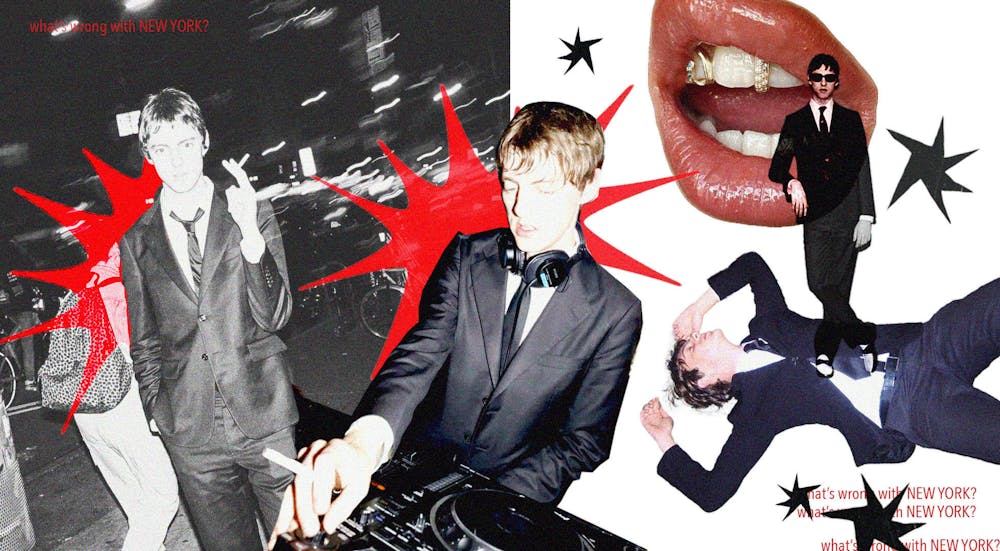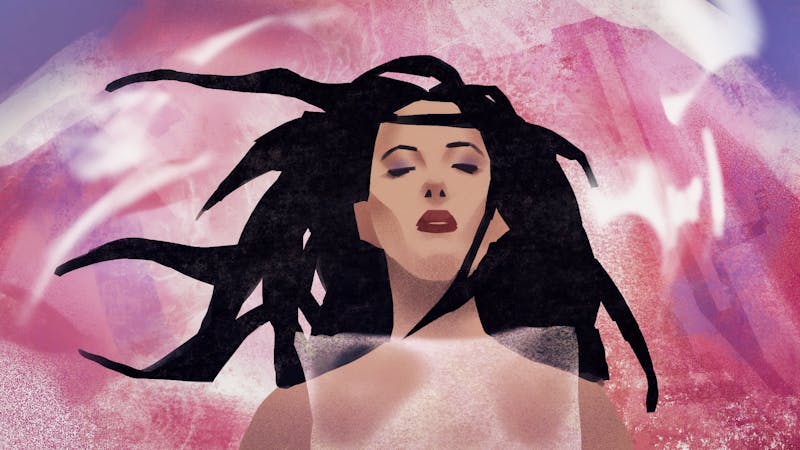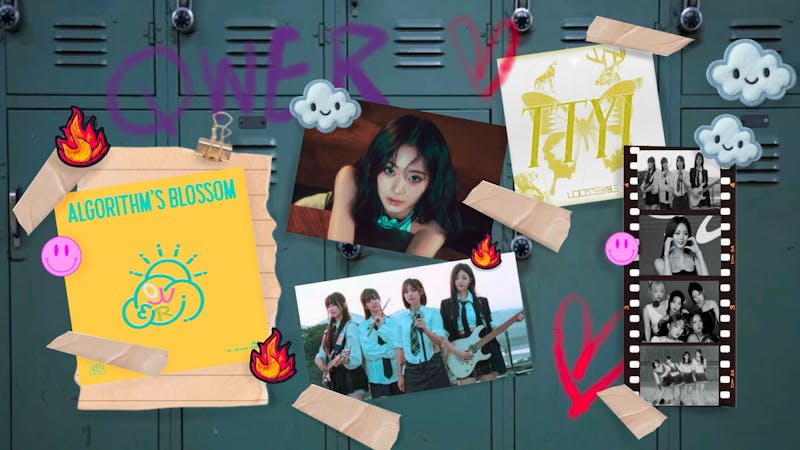It feels like The Dare’s song "Girls" is all around us. It’s become the (supposedly) sex positive anthem for the girls themselves, the backtrack of Instagram stories or self–referential thirst traps. It’s the talk of the effervescent “Indie Sleaze revival” we’re still waiting on, with everyone seeming to have a take on the return of a raunchy, sin–addled party scene for hipsters and the song as its poster child. Hell, we even used the song at a Street meeting as an icebreaker, Buzzfeed style–what type of girl are you?
“Girls” is the type of girl to be the lead single off The Dare’s, less commonly known as Harrison Patrick Smith’s, debut album, What’s Wrong with New York? (and his previous EP, The Sex). Coming off the single’s success, along with production on Charli XCX’s "Guess," the release was buzzing with listeners eager to contribute a hot take on the Flushed Away live–action figure in a skinny tie. After a few weeks post–release, the common consensus is that this album is not a renaissance of electroclash, dance punk, or bloghouse—but, a poor imitation of it, ubiquitously described as a weaker LCD Soundsystem. If The Dare is the vanguard of the supposed Indie Sleaze revival, have we failed?
If you’re part of the camp that thinks new music should constantly push boundaries, WWWNY? is a blunder. Nearly every song follows the same basic pop formula, with the addition of a chaotic instrumental break before the last chorus. The most notable exception is that most popular single again, “Girls." Smith works best as a producer, with a St. Vincent–esque groove to the opening track, “Open Up," cheekily matching “move your body like a tambourine" to the instrumentals.
Smith tests a similar shtick on the fan–favorite “I Destroyed Disco," marrying the introduction of the bassline with the line “does anyone know where the bass is?" in a classic party boy call–and–response move. On “Elevation," he amplifies the synths as he speaks of “elevation.” What could be an emotional ballad to break up the monotonous dance–pop, instead, becomes a cheesy appeal to Owl City–like energy. Smith uses the same beat–the–horse–to–death strategy in everything that might set him apart: his angsty crooning gets beyond grating to hear for 27 minutes straight, if it wasn’t disappointing enough on the first track. He speaks of a general sluttiness, but one that never goes anywhere. Never do we get the details, the interest of hearing what Smith might actually be doing with, or rather, to the girls in question.
As we know, the music we love serves an economic function. Smith is signed to Republic Records of Universal Music Group, but has yet to chart for anything other than “Guess featuring billie eilish.” WWWNY? lacks that sticky sweetness: the pestering catchiness of blockbuster pop songs. After listening to this album way too many times, and as someone who is extremely prone to getting songs stuck in his head, the album is a blur. The Dare's best hope would be getting his most teen–boyband–sounding songs, looking at you “All Night," on a soundtrack. Unfortunately, The Dare might only be made for royalties.
So if he’s not a boundary pusher nor a money puller, he must be expressing himself, right? I’d argue no. Nearly everyone is comparing Smith to LCD Soundsystem—just look at the comments of r/indieheads and you won’t see another name mentioned. Except, Smith lacks the Arthur Russell–like intimacy of James Murphy, the LCD frontman. Murphy's intense fixation on record digging translates into a close relationship of the music itself. He brings the listener into the song with him through atmospheric lyrics and a sense of naivete in his voice—the love for the music comes through the production, and the singing is a quaint, yet charming attempt at sharing his feelings.
Conversely, Smith gives us demo–itis on the vocals of tracks like “You Can Never Go Home” and “Good Time," paired with the braggadocio of “I Destroyed Disco” and “You’re Invited," the latter of which ironically tells us he wants to hear our demos. I’d argue it might be helpful to actually metamorphize the raw takes into proper songs, or, better, stop trying to make hits and let the goofiness speak for itself.
Part of the success of “Girls” is its throwaway quality. It was literally made in 30 minutes as a joke for a friend. Smith seemed more sure of himself in his Philly–based projects Turtlenecked or Sitcom. Here, he’s not trying to convince anyone he’s David Bowie, but rather the amateur producer–turned–rockstar he is.
One could argue that Smith's biggest failure is his imbrication with the downtown New York Scene. Gone are the Recession–era cheap Williamsburg rent prices or the DIY–band–while–drinking–PBR culture, the backbone of Smith's musical inspirations. To manage the pressures of $3,500 rents and the competitive attention economy of a short–form–video–ified music industry, people have turned right wing. Smith only remains tangent to the darker side of New York—where something is clearly wrong. Besides his convoluted ways of sexualizing women through a “sex–positive” lens, he’s found himself in the alt–right pop culture universe, running in the same circles as Dasha Nekrasova of the Red Scare podcast. The Dare's New York is a place where decrying the ‘deep state’ is peak humor and wearing a MAGA hat is a serious form of chic.
This is not the Indie Sleaze revival I want—one where, originally, Occupy Wall Street seemed like a plausible dream. Not to say The Dare is a neoreactionary, but his swift return to a politics of the body that tries to normalize such heterosexual promiscuity is something to be wary of—especially if he’s becoming aesthetically aligned with wannabe tradwives and alt–right podcasters. If the music is not carrying him, and the shock tactics of “I want to f**k” feel weak, who knows where this straight, white man might land.






